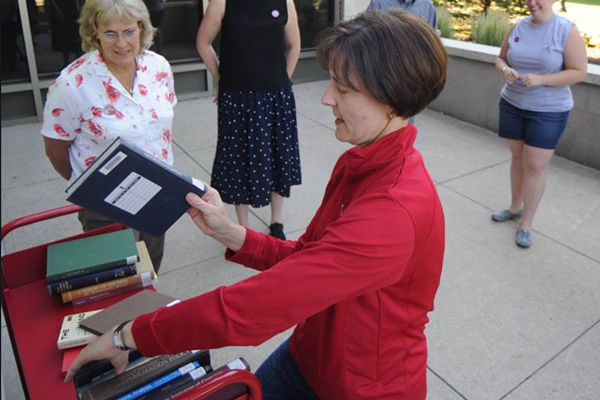University Libraries

An Olympic Ode to Cataloging
By Maureen Schlangen
When my colleagues in the University Libraries gathered on the west portico of Roesch Library June 9 for our own version of the Olympics, our competitive nature, mostly dormant in our daily work, emerged in events that put our teams to the test both physically and mentally: journal Jenga, journal toss, cart racing, book balancing, speed sorting and the hardest scavenger hunt I’ve ever participated in.
But like many things I’ve discovered in my two years in the Libraries, the information science that inspired these trivial games is anything but trivial.
As I raced to put a cart full of books in order by the Library of Congress call numbers on their spine labels, the very genius of this system occurred to me: Without orderly cataloging of the world’s knowledge, even in this age of search engines and high-speed networks, information could easily be rendered obscure in an ocean of data, accessed by mere chance rather than intention. Research being a cumulative process, where would it be without the ability of scholars to discover and build upon the work of others in a subject area?
Cataloging — the process that results in the spine labels on those books I sorted and all of the other information that describes a particular library material in the bibliographic record to make it discoverable in a search — is what makes this possible in libraries, subject databases and a wide variety of electronic resources. Behind those spine labels are enough call numbers to fill 41 Library of Congress Classification volumes — which we happened to use in our mad scavenger hunt for items on campus that matched the call numbers we were given.
Cataloging, done coherently, precisely, correctly and comprehensively, gets results — which is to say, search results. Whether the patron is a casual reader or a renowned researcher, reliable searches save time and advance knowledge, bringing the most relevant resources into view along with all the information necessary to access them.
I have great respect for the people who do this intricate, orderly, intuitive work, driven internally by the knowledge that in organizing the vast stores of information in print and at people’s fingertips, they are contributing in their own way to important discoveries in the near and distant future.
That’s medalworthy in my book.
- Maureen Schlangen, E-scholarship and communications manager
Note: All books and bound journals tossed, stacked, balanced or otherwise mishandled in the Library Olympics were marked for recycling.
